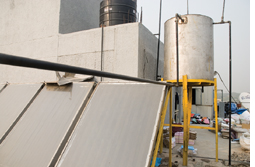Rooftop hot water harvesting
Rooftop hot water harvesting
You can save money, electricity and get piping hot water for your home with a solar water heater. In 2006, New Delhi made it mandatory for homes, institutions and offices to install solar water heaters, replacing water geysers that run on electricity. Almost all big cities of Maharashtra had, by 2002, amended their building bylaws to promote solar heaters and in some cases provide rebates such as concessions in price, cuts in monthly electricity tariffs or a reduction in property tax. Similar rules are in place in 14 other states.
But why then do we not install a solar water heater?
We don't understand the technology
It is a simple device, which absorbs solar radiation and heats cold water. The solar water heater works on the principles of blackbody radiation and greenhouse effect: it absorbs solar radiation efficiently, but does not allow it to reflect easily. At the heart of the system is a collector which absorbs the solar radiation.The system also includes hot water storage tanks, circulation systems and controls. 
The evacuated tube collector is entering the Indian market from China. It's compact design means it requires less area. The heater is also more efficient and, most importantly, is significantly cheaper than flat plate collectors. A Chinese system of 100 litres costs between Rs 12,000 and Rs 19,000. But with glass tubes, these heaters are more prone to breakage. There are also fears that the vacuum in the glass tubes







